Various transactions and processes require the collection and exchange of sensitive information, including medical reports, government records, financial data, and educational documents. Both local and federal laws typically protect this confidential information. Therefore, the owner must grant authorization for the sharing or access of such information by third parties. This can be accomplished through the use of a letter of authorization to release information. The letter gives explicit consent for the release of information and specifies the exact details of the information to be disclosed, as well as the authorized third parties who are permitted to access it. This careful approach ensures that privacy and confidentiality are maintained.
This article comprehensively discusses an authorization letter to release information, outlining its various applications, common usage scenarios, key components, and the potential need for notarization. By reading this article, you will gain a thorough understanding of how to utilize it effectively to protect your private data.
A letter of authority to release information serves as a formal consent document that grants a designated person or entity the right to access specific information on your behalf. This document is essential in situations involving the privacy and confidentiality of personal or sensitive data. Its primary purpose is to ensure that information is only shared with authorized individuals and for specified purposes.
Some of the common scenarios where the letter is used include;
Medical records
One instance where this letter is utilized is when seeking consultation from a new healthcare professional and desiring your primary physician to share your medical records. The letter empowers your new physician to access your diagnostic reports, observations, test results, etc., or any other information you explicitly authorize.
Financial matters
Given the sensitivity of financial data, it becomes crucial to employ a letter of authority to grant a third party, such as a bank or creditor, access to your financial particulars, such as income, tax returns, credit history, etc. You can also use the letter to authorize a financial advisor to access your bank statements and other related documents if you need assistance managing your finances.
Academic records
For individuals applying to new educational institutions, the letter can play an important role. It allows your previous educational institution to release your academic transcripts to the prospective one. Moreover, as an alumnus, you can use the letter to permit other entities, such as government agencies and companies, to access your academic records.
Legal matters
An authorization letter can be used in legal situations, such as court proceedings, to allow different parties to access legal documents.
Samples and Templates
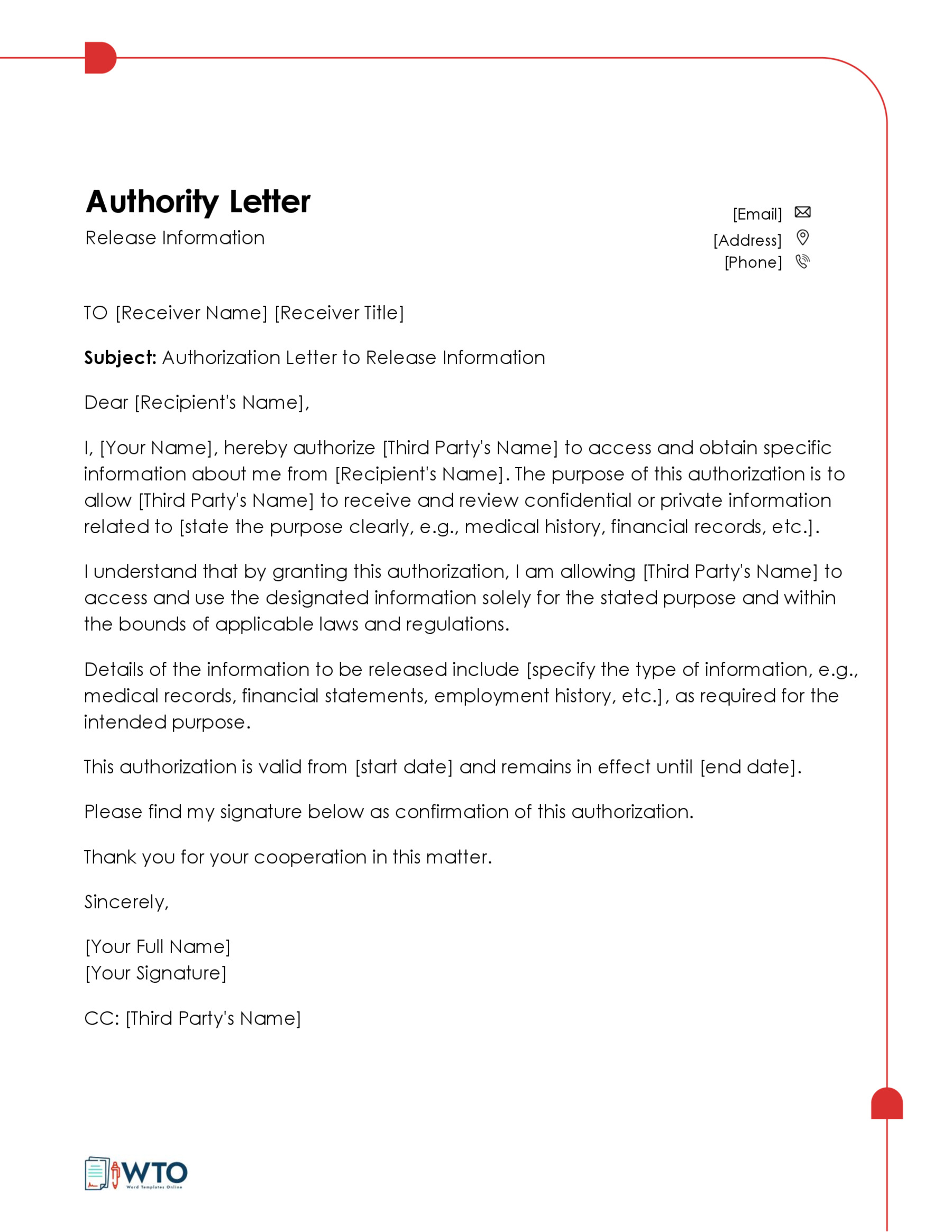
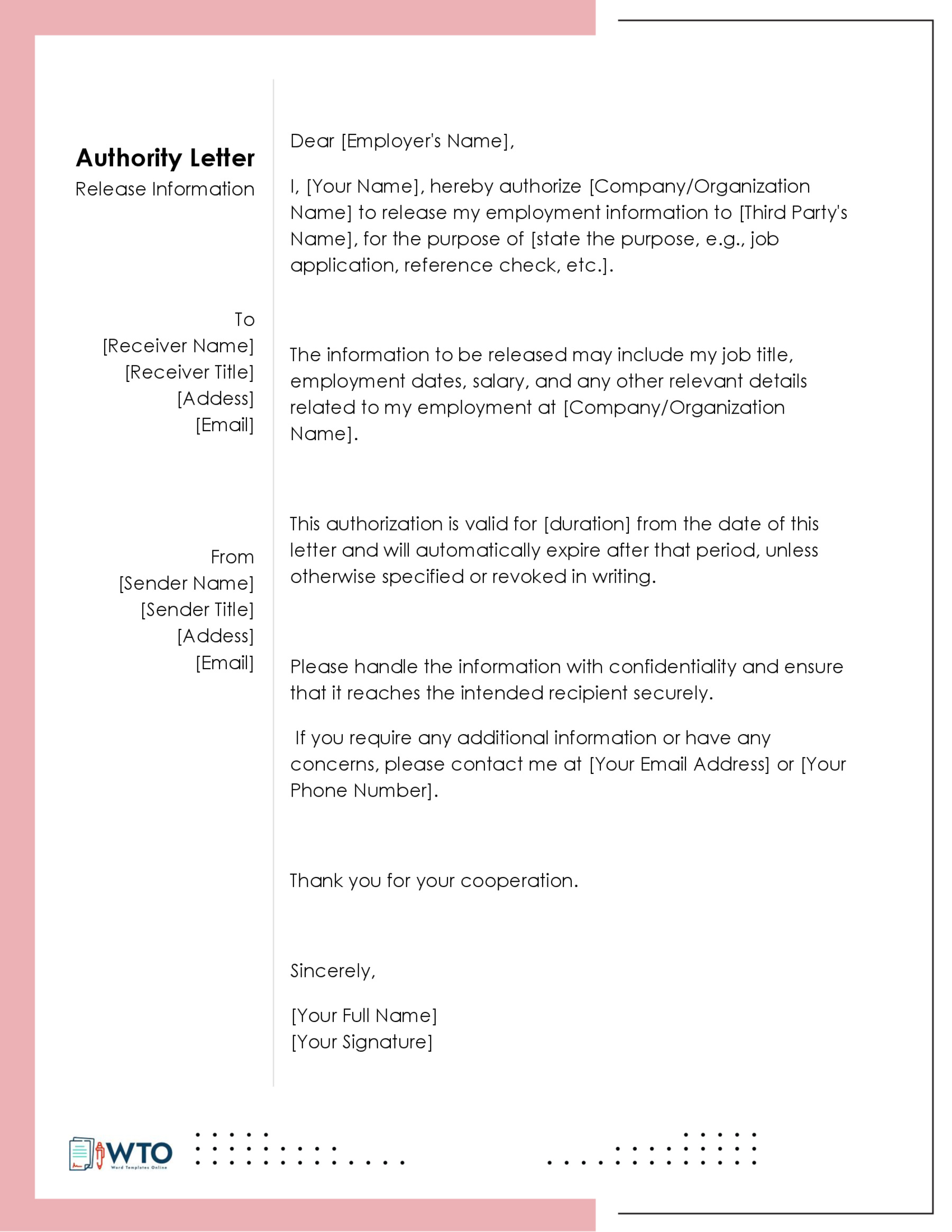
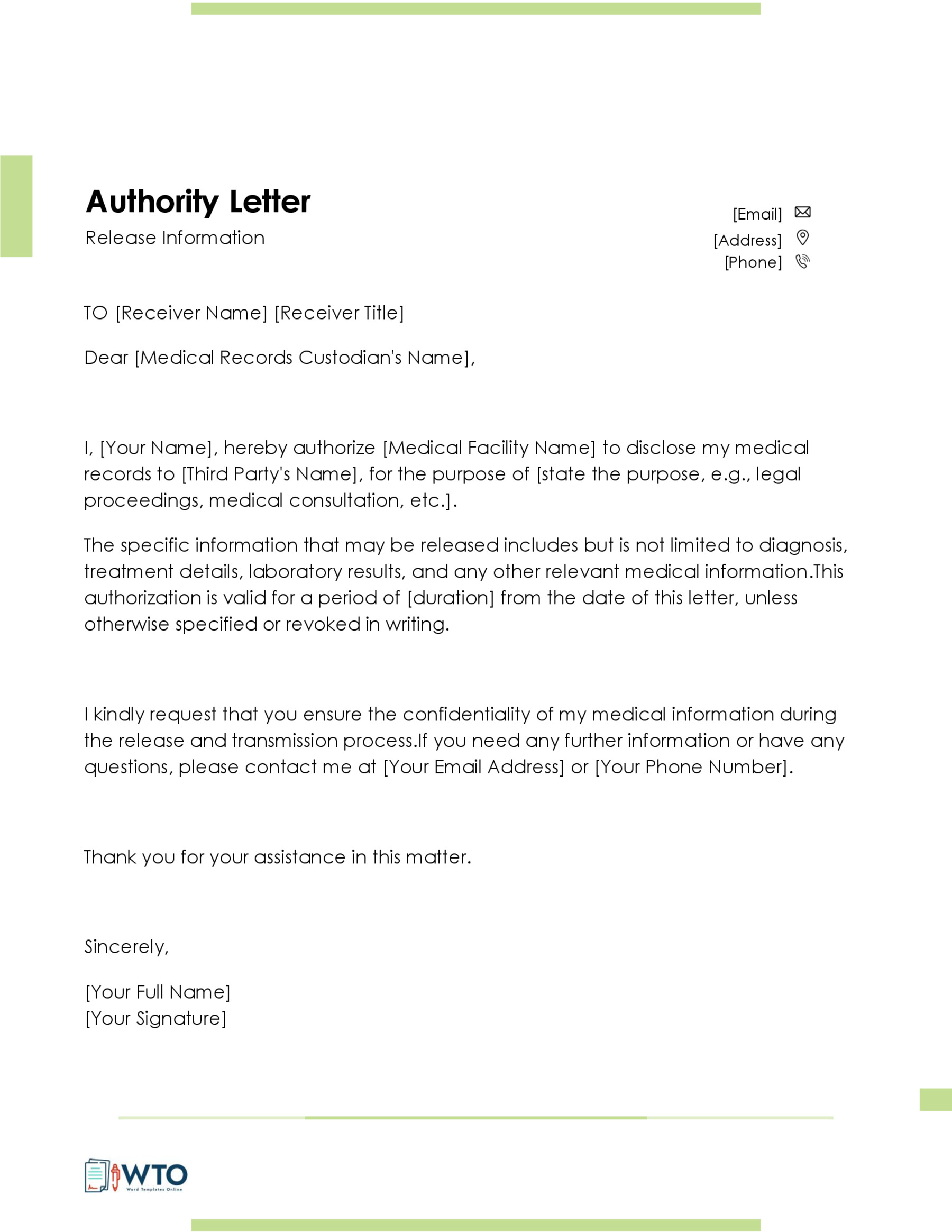
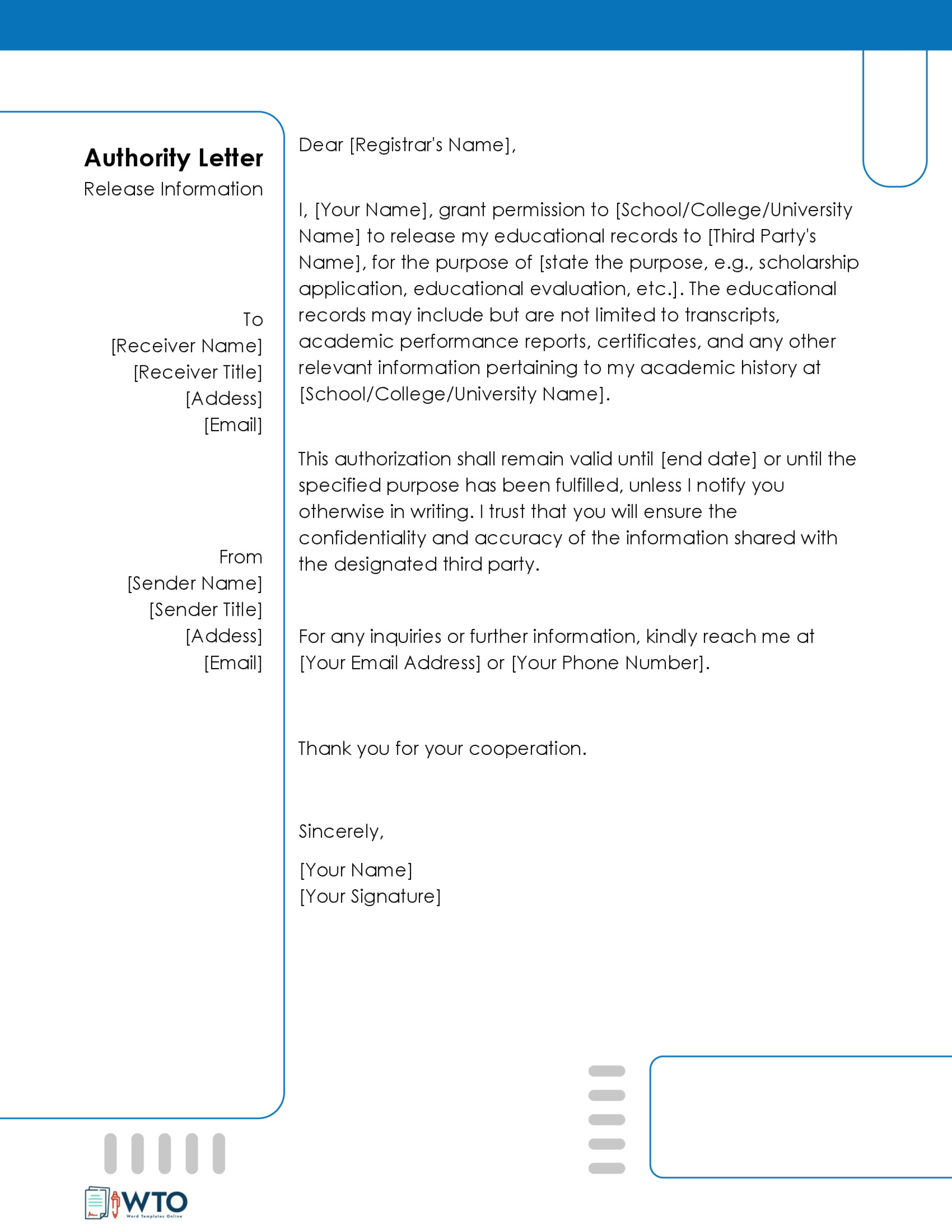
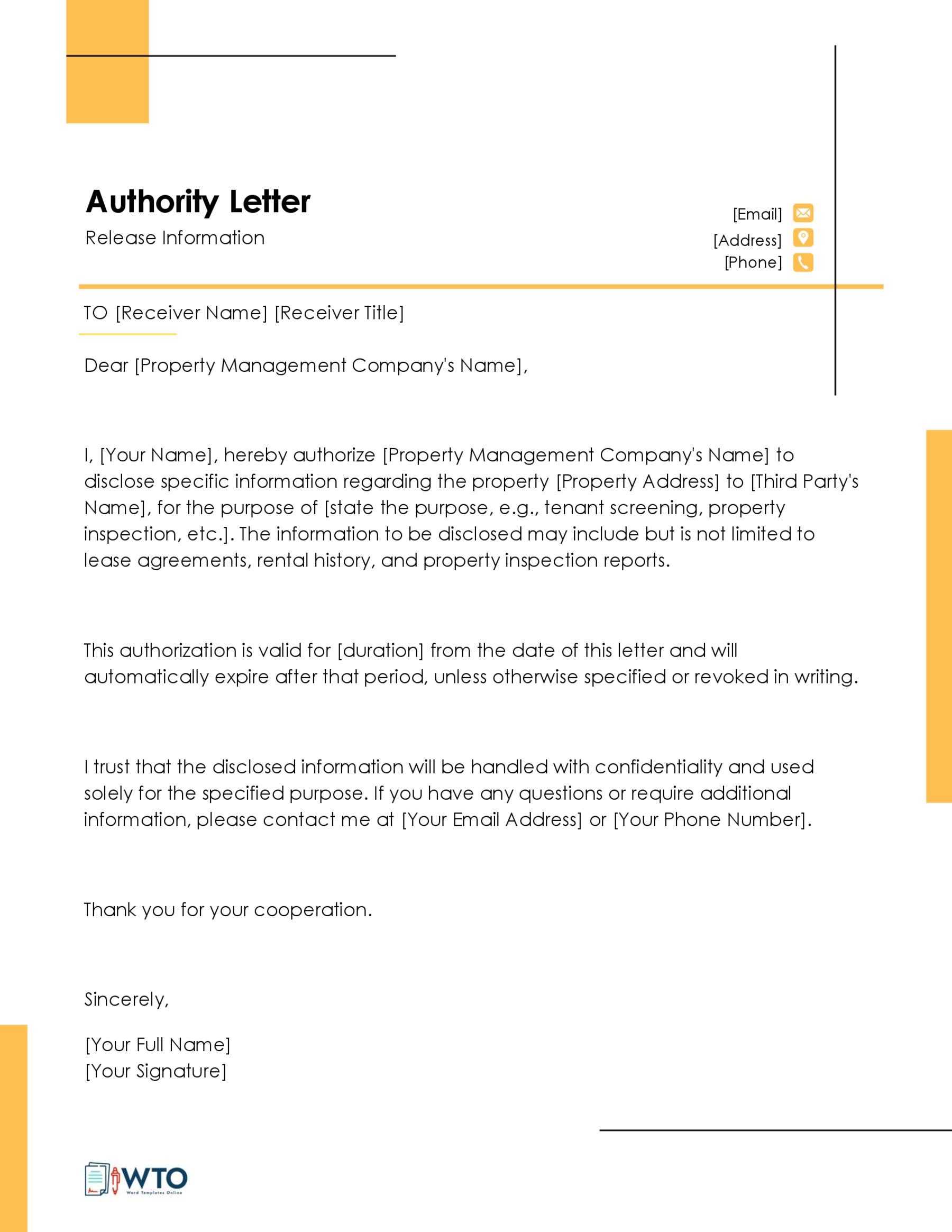
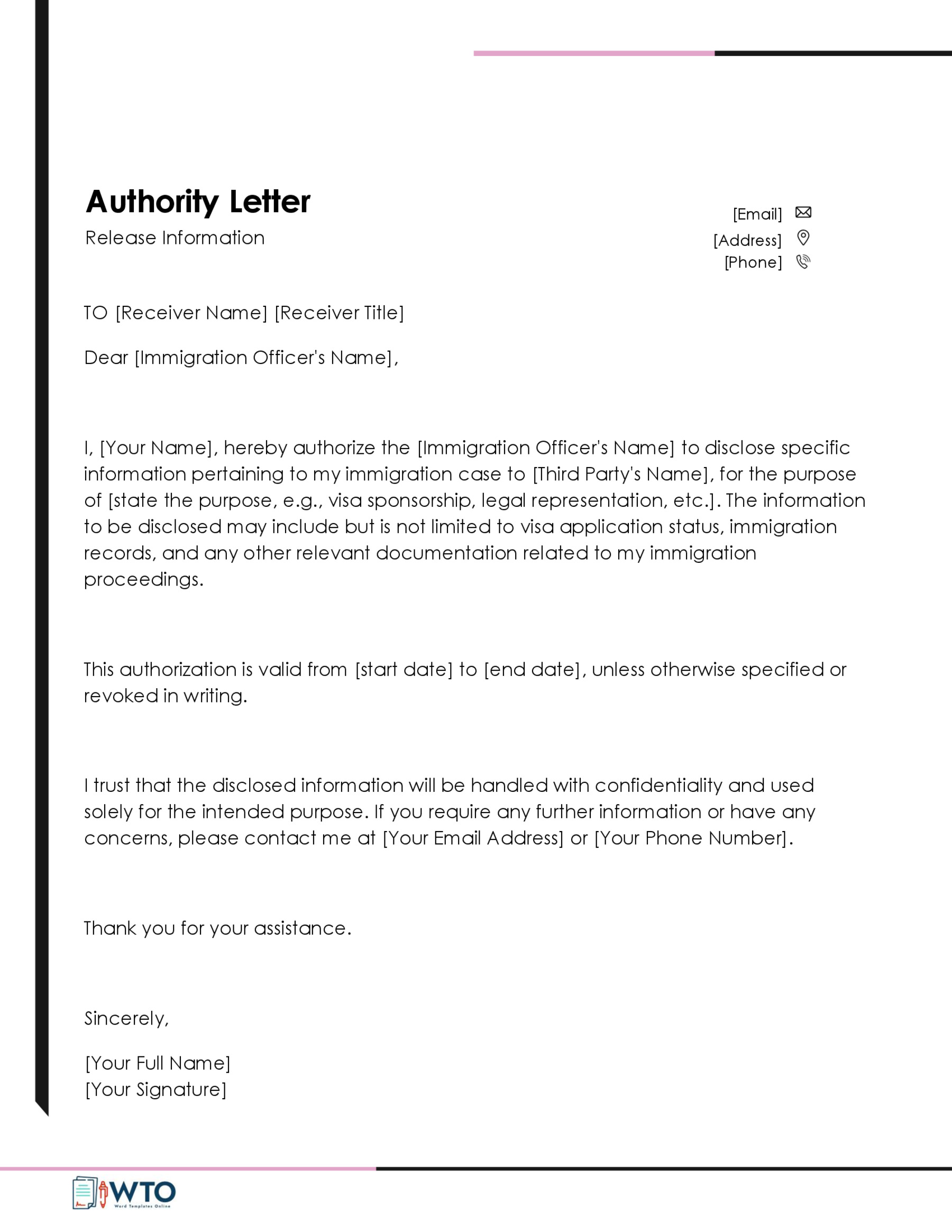
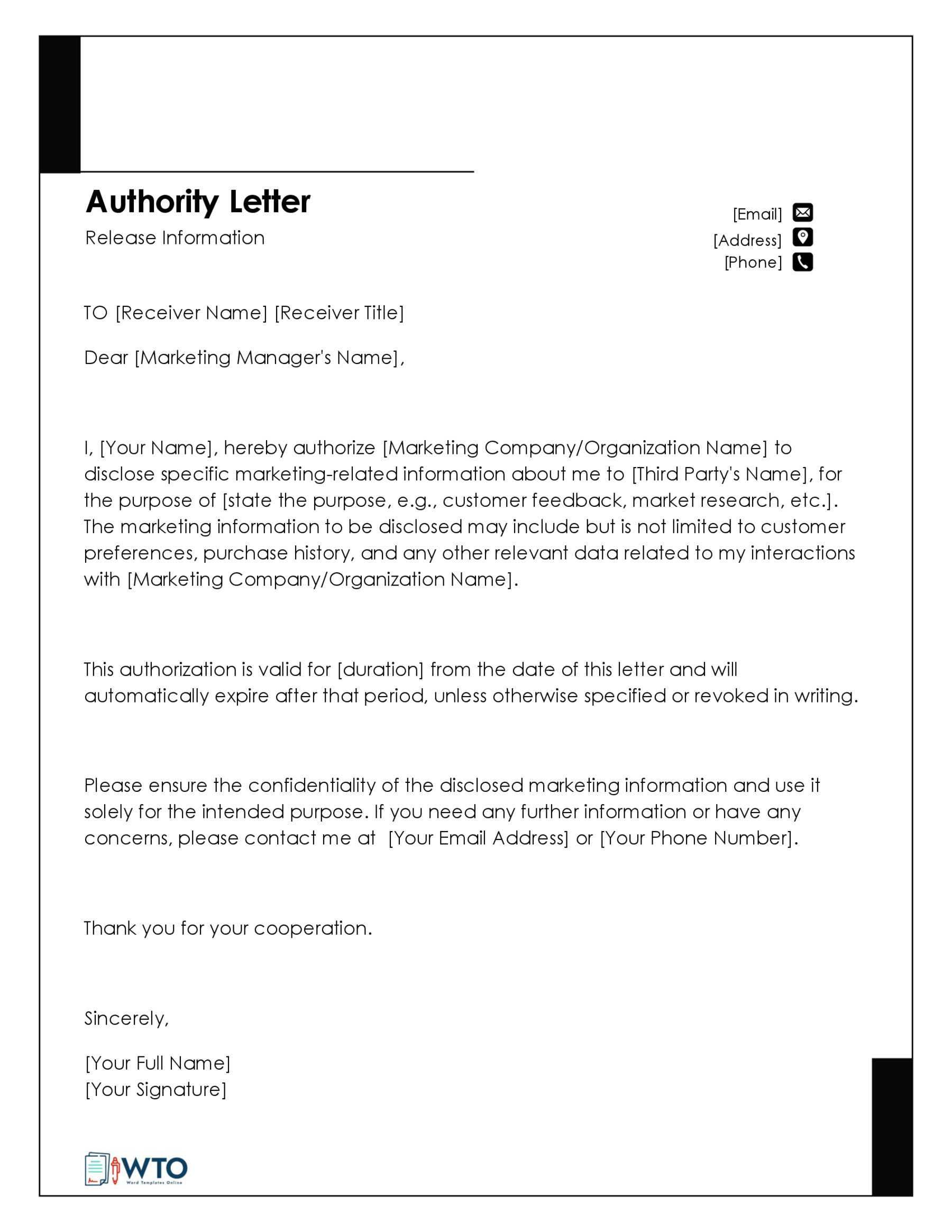
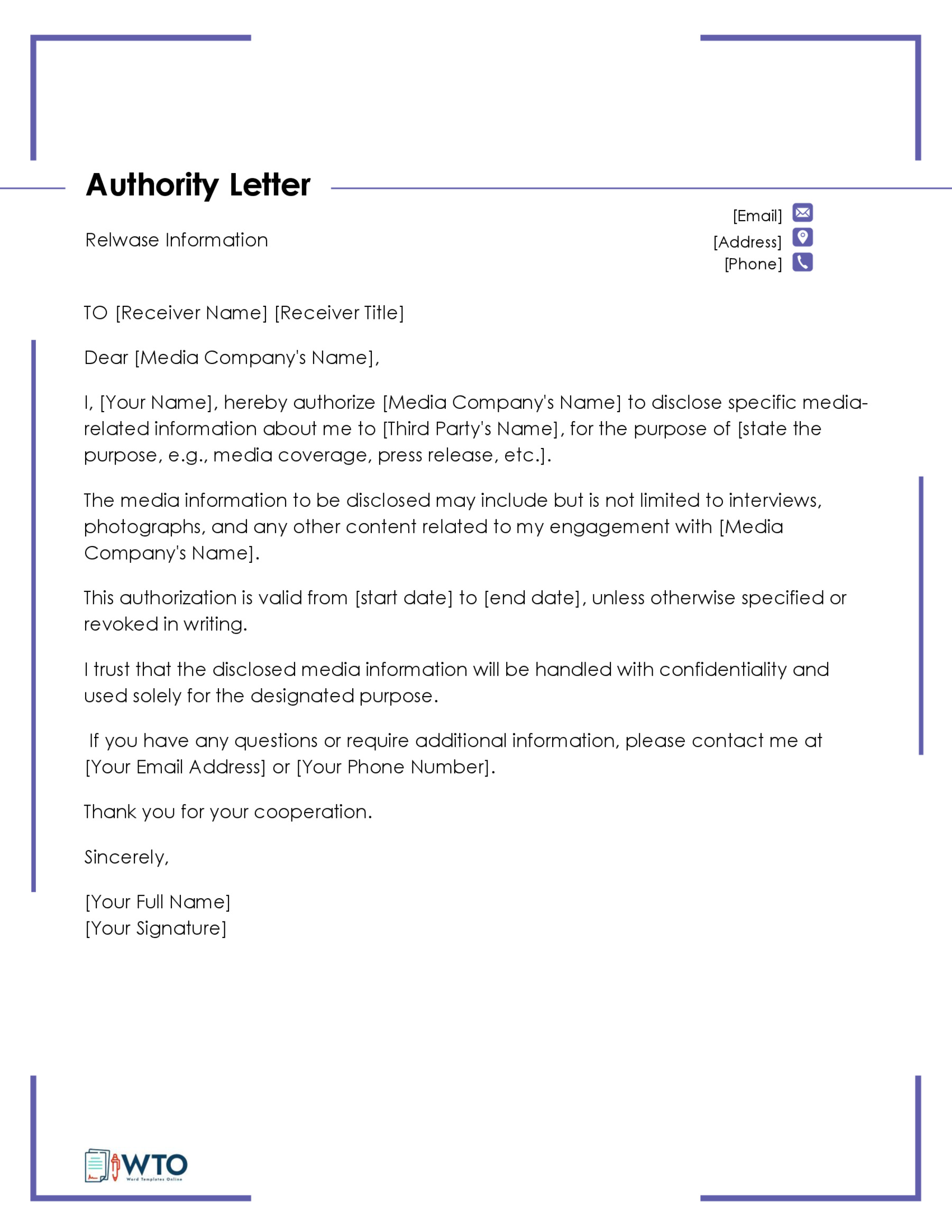
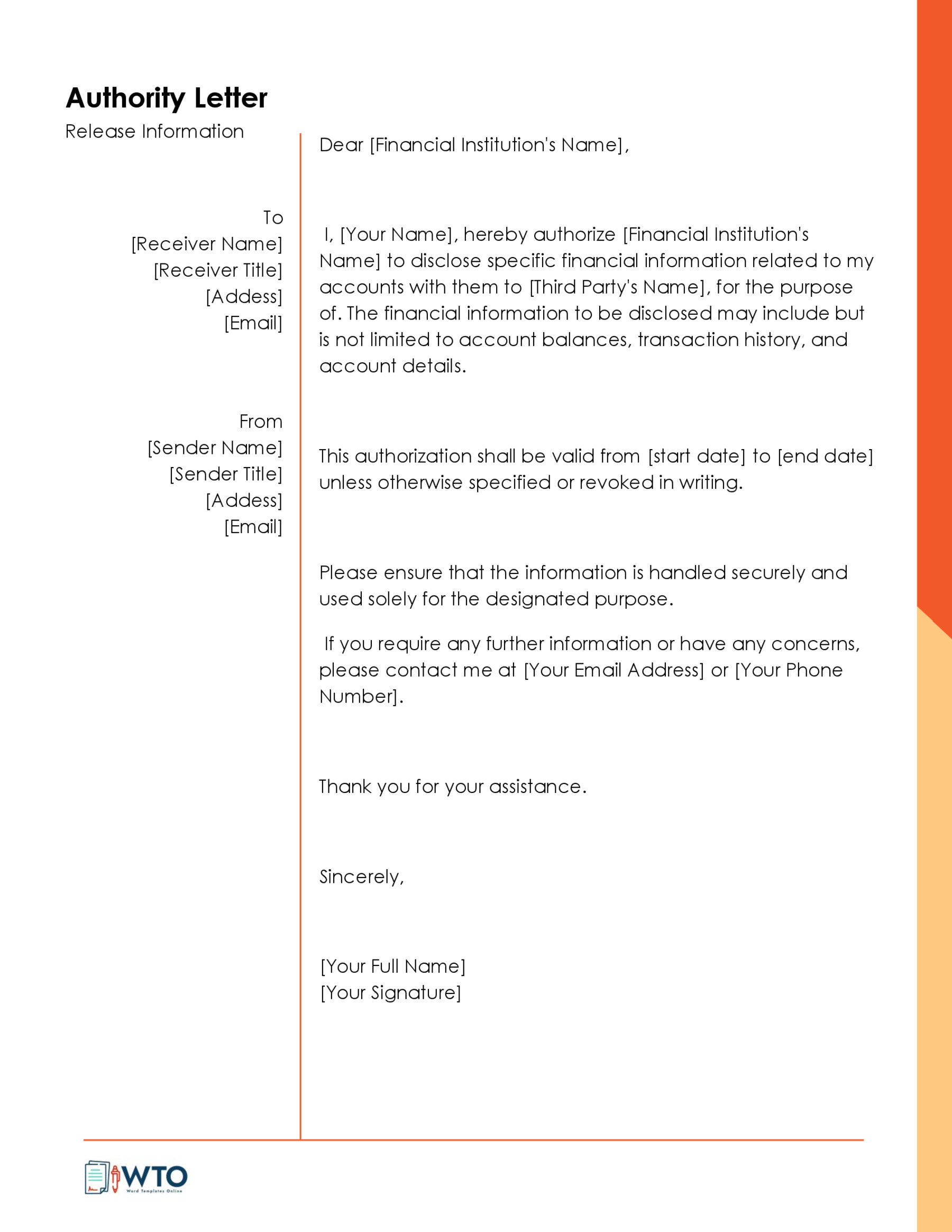
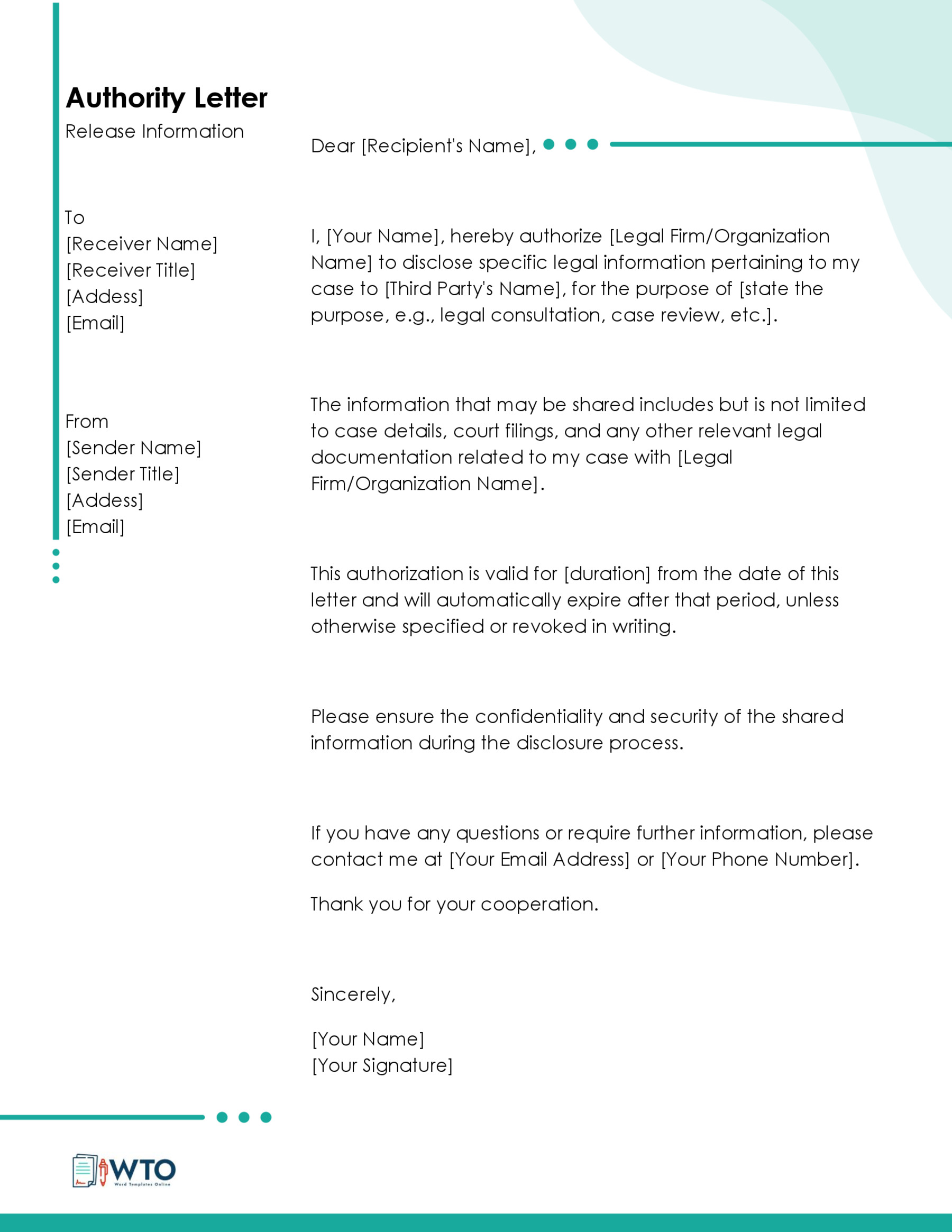
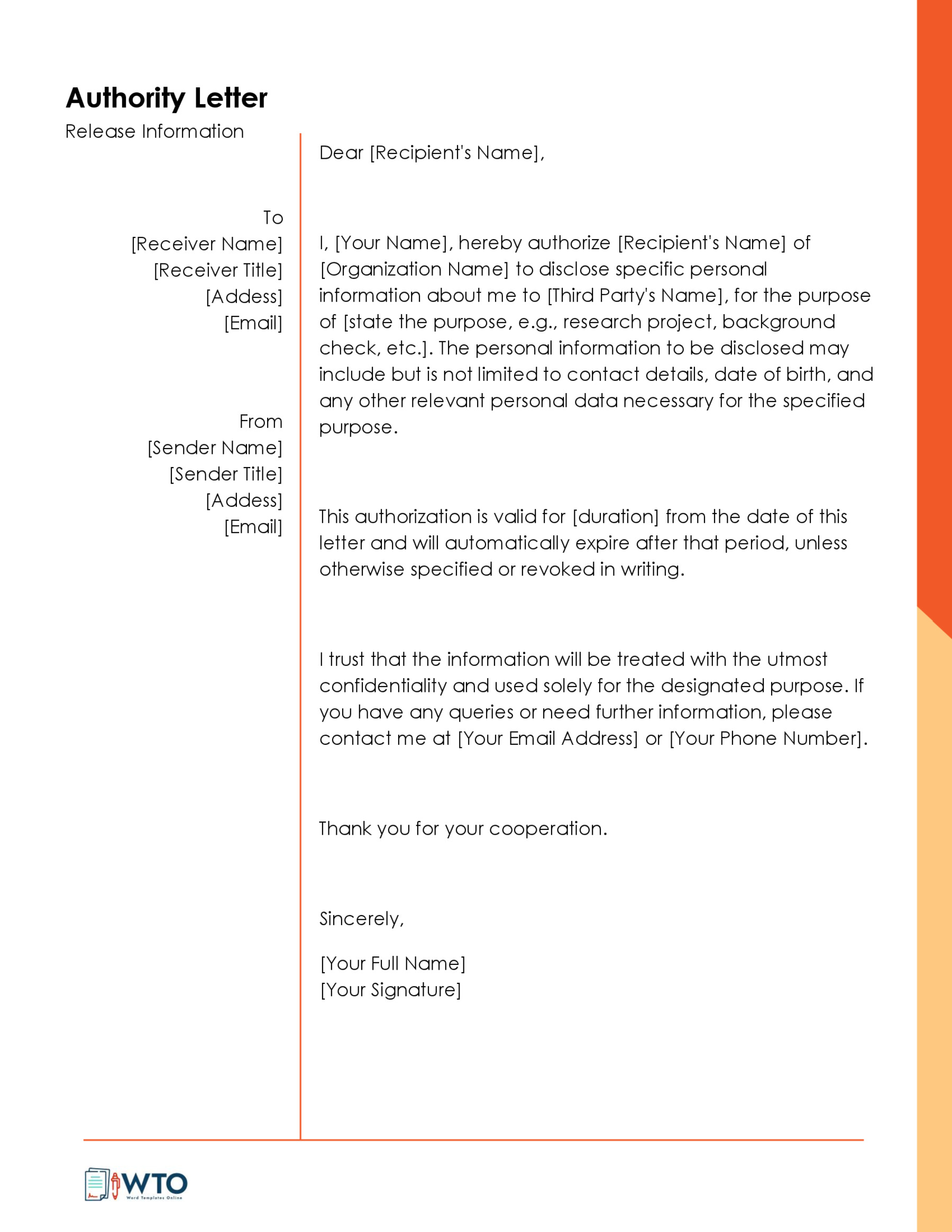
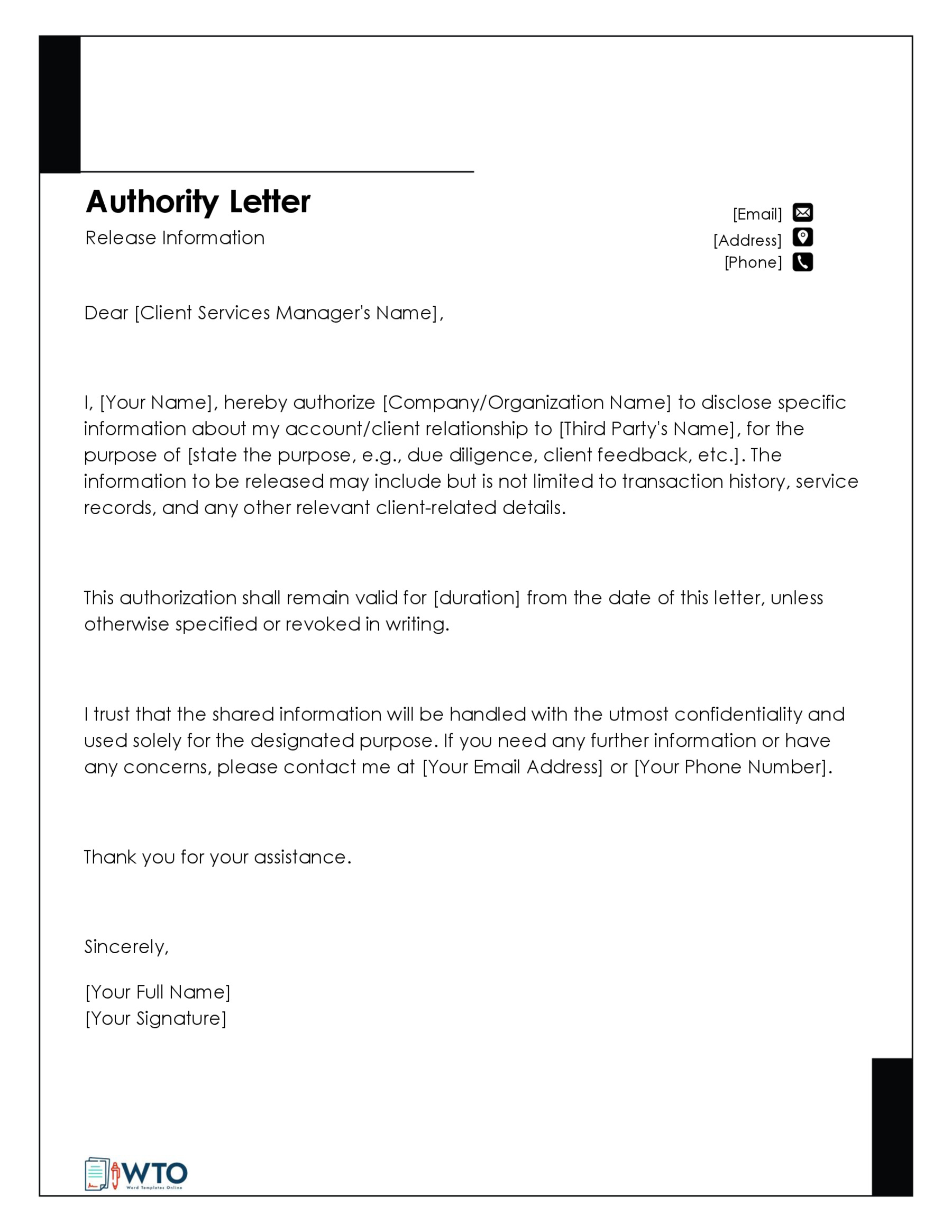
Key Components of an Authorization Letter to Release Information
The specific format and content of an authorization letter may vary based on legal and institutional requirements. Therefore, you must ensure that the letter meets all necessary standards and is legally binding. It is recommended to seek counsel from legal professionals or relevant authorities to craft a legally enforceable letter that reveals the appropriate information while protecting your sensitive data.
With this in mind, specific pieces of information must be included within such a letter. The authorization letter typically includes the following key elements:
Authorization statement
Begin by explicitly stating that you are granting your full and voluntary permission for the authorized recipient to access and obtain the specified information. Mention the names of both the authorizing party (yourself) and the authorized recipient (the individual or entity receiving permission) to clarify each party’s role in the authorization.
Recipient information
Subsequently, identify the individual, organization, or entity authorized to access the information. Include their full name, contact information, and any relevant identification details, such as the recipient’s title, address, and email. This ensures that the authorization is limited to the intended recipient.
Purpose of authorization
Specify the exact reason why you granted the authorization. Define the scope, and if there are any limitations on the authorization, mention them in the statement. This helps prevent the exploitation of the authorization beyond its intended scope.
Description of the information
This section provides details of the type of information being disclosed. You can permit the disclosure of either general or highly specific information. Include the names of the documents, account numbers, dates, or any other reference details.
EXAMPLE
In a medical context, you can state whether the recipient will be authorized to access your entire medical history or specific test results.
In a financial setting, you can explicitly state whether they can access all your financial records or specific documents, such as statements or pay slips.
Date and duration
Next, specify the effective or issuance date of the authorization. Clarify whether the authorization is valid for a one-time request or a specific duration. Indicate the expiration date or clarify that the authorization is valid until it is revoked in writing. This helps prevent unauthorized access to information beyond the intended timeframe.
Authorizer’s information
Then, provide your identification details to indicate that you are the party issuing the authority. Include your name, address, contact number, email, and signature. A signature certifies that you agree to the stipulations of the letter, making it legally binding.
Notarization (if required)
Lastly, some situations may necessitate notarization, which involves a certified notary public verifying the identities of the parties and witnessing the signatures. For proper notarization, ensure the following details are captured – the notary public’s acknowledgment, name, official stamp or seal, and date of notarization. However, note that notarization is contingent on the context in which the letter is used and the parties involved.
Authorization Letter to Release Information Template
TEMPLATE
[Your Full Name]
[Your Address]
[City, State, Zip Code]
[Email Address]
[Phone Number]
[Date]
[Recipient’s Full Name or Organization’s Name]
[Recipient’s Address or Organization’s Address]
[City, State, Zip Code]
Subject: Authorization to Release Information
Dear [Recipient’s Name or Organization’s Name],
I, [Your Full Name], hereby authorize [Name of Individual/Organization Authorized to Receive Information], their representatives, or designated agents to access and receive [specific information to be released, e.g., medical records, financial documents, employment history] pertaining to myself/my account/my case. This information is to be used solely for the purpose of [clearly state the purpose, e.g., completing a loan application, medical treatment, employment verification].
The details of the information authorized for release are as follows:
- Type of information: [Detail the specific type of information or documents]
- Time period: [Specify the time period for which information is relevant, if applicable]
- Any other specific details or restrictions on the information to be released
This authorization is valid from [Start Date] until [End Date]. Please note that I reserve the right to revoke this authorization at any time by providing written notice to [Recipient’s Name or Organization’s Name].
I appreciate your cooperation and prompt attention to this matter. Should you require any further information or clarification, please do not hesitate to contact me directly at [Your Phone Number] or via email at [Your Email Address].
Thank you for your assistance.
Sincerely,
[Your Signature (if sending a hard copy)]
[Your Full Name]
Notarization Block
STATE OF [State Name]
COUNTY OF [County Name]
Subscribed and sworn before me on this [Day] day of [Month], [Year], by [Your Full Name], who proved to me on the basis of satisfactory evidence to be the person(s) whose name(s) is/are subscribed to the within instrument and acknowledged to me that he/she/they executed the same in his/her/their authorized capacity(ies), and that by his/her/their signature(s) on the instrument, the person(s), or the entity upon behalf of which the person(s) acted, executed the instrument.
I certify under PENALTY OF PERJURY under the laws of the State of [State Name] that the foregoing paragraph is true and correct.
WITNESS my hand and official seal.
[Signature of Notary Public]
[Printed Name of Notary Public]
Notary Public for the State of [State Name]
My commission expires: [Expiration Date of Notary’s Commission]
Sample Authorization Letters
Sample Letter Authorization to Release Medical Information
Subject: Authorization to Release Medical Information
Dear Lakeside Medical Center,
I, Jordan Smith, born on April 10, 19XX, hereby grant permission to Lakeside Medical Center, its representatives, or designated agents, to access and obtain copies of my medical records and health information from Riverside Clinic. This authorization encompasses diagnostic reports, treatment histories, prescription details, and all other medical data pertinent to my treatment at Riverside Clinic, covering the period from January 20XX to December 20XX.
The purpose of this authorization is to ensure the continuity of care for my ongoing treatment for Type 1 Diabetes.
Please provide the specified medical information to:
Lakeside Medical Center
Medical Records Department
456 Lakeview Drive
Springfield, IL 62711
Phone: (555) 123-4567
Fax: (555) 765-4321
This authorization is valid through December 31, 20XX, unless I revoke it earlier in writing. I understand my right to revoke this authorization at any time and acknowledge that the revocation will not affect any actions taken prior to the receipt of the revocation notice.
Your cooperation in releasing the specified medical information as authorized herein is greatly appreciated. Should you require further information or clarification, please do not hesitate to contact me directly at (555) 987-6543 or via email at jordan.smith@email.com.
Thank you for your prompt attention to this matter and for assisting in my healthcare management.
Sincerely,
Jordan Smith
Notarization Block
State of Illinois
County of Sangamon
On this 16th day of February, 20XX, before me, Maria Gonzalez, a Notary Public in and for said state, personally appeared Jordan Smith, known to me (or satisfactorily proven) to be the person whose name is subscribed to the above instrument, and acknowledged that he executed the same for the purposes therein contained.
In witness whereof, I hereunto set my hand and official seal.
[Signature]
Maria Gonzalez
Notary Public
My Commission Expires: 03/31/20XX
Sample Letter Authorization to Release Financial Information
Subject: Authorization to Release Financial Information
Dear Acme Financial Services,
I, Emily Joyce, hereby authorize Brighton Credit Union, including its representatives and designated agents, to access and release my financial information to Acme Financial Services. This information includes account balances, transaction history, loan details, and credit reports, as held by Brighton Credit Union from January 1, 20XX, to December 31, 20XX.
The purpose of this authorization is to support my application for a mortgage refinancing with Acme Financial Services. I understand that this information is crucial for completing the application process and determining my eligibility for refinancing options.
Please direct the release of the specified financial information to:
Loan Officer
Acme Financial Services
123 Finance Avenue
Ashton, CA 90210
loanofficer@email.com
[555-678-9012]
This authorization is valid for a period of 60 days from the date above, ending on April 17, 20XX. I acknowledge that I have the right to revoke this authorization at any time by sending written notice to Brighton Credit Union.
I appreciate your cooperation in this matter and request that you process this authorization promptly to avoid any delays in my mortgage refinancing application.
Should you require further verification or additional details, please do not hesitate to contact me directly at my phone number or email address provided above.
Thank you for your attention to this request.
Sincerely,
[Emily Joyce Signature]
Emily Joyce
Notarization Block
State of California
County of Los Angeles
On this day, February 16, 20XX, before me, Maria Gonzalez, a Notary Public in and for said state, personally appeared Emily Joyce, known to me (or satisfactorily proven) to be the person whose name is subscribed to the within instrument and acknowledged that she executed the same for the purposes therein contained.
In witness whereof, I hereunto set my hand and official seal.
[Signature]
Maria Gonzalez
Notary Public
My Commission Expires: July 28, 20XX
Sample Letter of Authorization for Release of Academic Records
Subject: Authorization to Release Academic Records
Dear Registrar,
I, Jonathan Smith, a graduate of Westfield University with the student ID number WU123456, majoring in Environmental Science, hereby authorize the release of my academic records, including transcripts, enrollment history, and degree certifications. I grant permission to [Lincoln Job Placement Services], their representatives, or designated agents, to access and obtain these records for the purpose of verifying my educational qualifications in connection with my job application process.
The details of the information authorized for release are as follows:
- Type of information: Transcripts, enrollment history, degree certifications
- Time period: From August 20XX to May 20XX
- Purpose: Job application verification by Lincoln Job Placement Services
Please provide the specified academic records to:
Rebecca Taylor
Lincoln Job Placement Services
321 Career Lane
Greenwood, IN 46144
[rebecca.taylor@lincolnjobs.com]
[555-678-9012]
This authorization is valid until April 30, 20XX, to ensure sufficient time for the completion of my job application process. Please note that I reserve the right to revoke this authorization at any time by providing written notice to the Registrar’s Office of Westfield University.
I appreciate your prompt attention to this request and your cooperation in facilitating the release of my academic records as authorized herein.
Should you require any further information or verification, please do not hesitate to contact me directly at my phone number or email address provided above.
Thank you for your assistance.
Sincerely,
[Jonathan Smith Signature]
Jonathan Smith
Notarization Block
State of Indiana
County of Johnson
On this day, February 16, 20XX, before me, Elizabeth Martinez, a Notary Public in and for said state, personally appeared Jonathan Smith, known to me (or satisfactorily proven) to be the person whose name is subscribed to the within instrument and acknowledged that he executed the same for the purposes therein contained.
In witness whereof, I hereunto set my hand and official seal.
[Signature]
Elizabeth Martinez
Notary Public
My Commission Expires: August 15, 20XX
Final Thoughts
In conclusion, an authorization letter to release information is a tool of empowerment in an age of data sensitivity. It allows you to control the flow of your confidential information while facilitating official or legal processes and collaborations. It achieves this by granting explicit permission, specifying the scope of access, and identifying authorized recipients. However, it must be well structured to ensure the letter effectively fulfills its purpose. Therefore, by comprehending its elements and crafting the letter thoughtfully, you can confidently navigate the intricate landscape of information sharing with the assurance of confidentiality. Whether it is medical records, financial data, educational transcripts, or legal documents, the authorization letter serves as a legal instrument to grant permission and define the scope and limitations of access.











